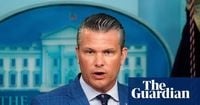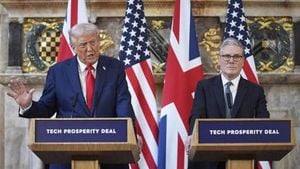Secretary of Defense Pete Hegseth is no stranger to controversy. Since his nomination in January 2025, Hegseth, a former Fox & Friends host, has become one of the most polarizing figures in the U.S. government. His outspoken embrace of ultra-conservative Christianity—and the way he’s woven it into Pentagon culture—has sparked a fierce national debate about religion, military policy, and the future of American democracy.
The latest firestorm erupted on August 15, 2025, when Pentagon Press Secretary Kingsley Wilson addressed mounting questions about Hegseth’s views on women’s rights. "Of course the Secretary thinks that women should have the right to vote," Wilson stated, aiming to quell speculation after Hegseth’s recent social media activity drew intense scrutiny (as reported by The Advocate).
That scrutiny intensified when Hegseth publicly acknowledged his membership in the Communion of Reformed Evangelical Churches (CREC), an archconservative network of Christian congregations. According to the Associated Press, Hegseth not only attends Pilgrim Hill Reformed Fellowship—a CREC member church in a Nashville suburb—but also enthusiastically shared a CNN video featuring CREC pastors who argued that women should not have the right to vote. The video included the motto, "All of Christ for All of Life," a slogan for embracing Christianity in every aspect of society—including government.
Doug Wilson, a co-founder of CREC and leader of Christ Church in Moscow, Idaho, has never shied away from controversy. In a recent interview with the Associated Press, Wilson expressed gratitude for Hegseth’s public support. "He was, in effect, reposting it and saying, 'Amen,' at some level," Wilson remarked. Wilson’s views are unapologetically patriarchal: his church and denomination practice complementarianism, barring women from leadership and requiring married women to submit to their husbands. While Wilson admitted that his wife and daughters do vote, he described the 19th Amendment—which granted women the right to vote—as "a bad idea." In his church, the head of the household, usually the husband, casts the vote in church elections, though unmarried women can vote as members.
Hegseth’s ties to CREC and Pastor Wilson have been confirmed by Pentagon spokesman Sean Parnell, who told both the Associated Press and The Guardian, "The Secretary is a proud member of a church affiliated with the Congregation of Reformed Evangelical Churches, which was founded by Pastor Doug Wilson. The Secretary very much appreciates many of Mr. Wilson’s writings and teachings." These connections have only deepened as CREC recently opened Christ Church DC in the nation’s capital, with Hegseth attending its inaugural service.
Critics argue that Hegseth’s religious affiliations and public statements are not just personal beliefs—they’re shaping Pentagon policy and culture. The Guardian reported on August 14, 2025, that Hegseth’s religiosity is now evident in official Department of Defense recruitment ads and social media campaigns. One video, posted on X (formerly Twitter), featured paratroopers and soldiers in a Middle Eastern desert, overlaid with the biblical text, "I pursued my enemies and overtook them. I did not turn back till they were destroyed." The post’s message: "We Are One Nation Under God."
Such overt religious messaging has alarmed many veterans and active-duty personnel. Mike Pruitt, a Navy veteran and Democratic congressional candidate from Virginia, told The Guardian, "I have certainly heard from friends of mine who are still in service expressing frustration about the way that their role is being cast as political." Pruitt, who describes himself as both a patriotic American and a practicing Christian, believes Hegseth’s approach to faith is rooted in "toxic machismo" rather than the inclusive teachings of Jesus. "The man has all his ‘deus vult’ tattoos and his hospitaller crosses because he wants to imagine himself as the picture book hero, as the knight," Pruitt said. "That is not what our military is, that is not what our country is, and that is not what the Christian mission is."
Kristofer Goldsmith, an Iraq war veteran and CEO of Task Force Butler, a watchdog group investigating extremism in the military, echoed these concerns. "Every time Hegseth does one of these things, I’m getting messages from active duty troops, reaching out to me more and more, saying ‘How do I get involved?’" Goldsmith said. He warned that the growing influence of Christian nationalism among the ranks could have disastrous long-term effects. "We’re gonna see a lot of Christian nationalists join the military. They’re not gonna perform very well, and our national security will suffer for a generation for it, because those that don’t wash out will be toxic leaders."
Hegseth’s tenure has also been marked by sweeping personnel changes. According to The Guardian, he has overseen the removal of thousands of transgender troops and the firing of senior female service members and officers of color, all while denouncing "woke" policies. This shift stands in stark contrast to the previous administration’s efforts to address extremism and promote diversity within the military. In February 2021, then-Secretary of Defense Lloyd Austin issued a historic "stand-down order" to confront extremism in the ranks, followed by new guidelines on social media conduct and recruitment. Hegseth and his allies on Fox News criticized these initiatives, claiming they undermined military readiness.
For supporters of Hegseth and the CREC, the Secretary’s actions represent a return to traditional values and a rejection of what they see as left-wing overreach. Pastor Wilson, who is open about his Christian nationalist agenda, has written, "If we succeed, this will be Christian America 2.0." He’s unapologetic about his desire for a fusion of American and Christian identity, principles, and symbols. "I am more than happy to work with that label because it’s a better label than what I usually get called," Wilson told the AP, referencing terms like "white nationalist" and "theo-fascist."
Yet, for many others, the Secretary’s policies and rhetoric are a source of deep concern. Goldsmith noted that the level of resistance among military and veteran communities is unlike anything he’s seen since the anti-war protests of the Bush era. "We’ve got active-duty troops who recognize that the military they’re serving in, has become a threat to democracy," he said.
As the Pentagon faces ongoing recruitment shortfalls and a rapidly changing geopolitical landscape, the debate over Hegseth’s leadership is likely to intensify. The intersection of faith, policy, and military service has never been more fraught—or more consequential—for the future of the United States armed forces.
With every new headline and policy decision, the question grows sharper: Can the U.S. military remain a unified, apolitical force in an era when religious ideology is wielded from the highest offices of defense?




